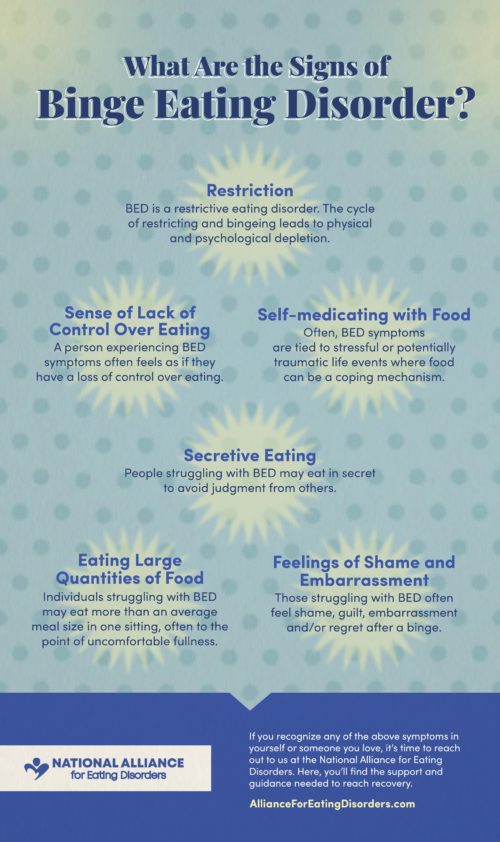Indicators on Eating Disorder Recovery You Should Know
Table of ContentsFacts About Eating Disorder Recovery UncoveredThe Ultimate Guide To Eating Disorder RecoveryEverything about Eating Disorder RecoveryAn Unbiased View of Eating Disorder Recovery
Nonetheless, repeated as well as integrated behaviours like these can be a sign of an eating disorder and should be checked. An individual's state of mind and also exactly how it is displayed or revealed (influence) can supply some more insight into the chance that they are experiencing an eating problem. Signs to keep an eye out for include: social withdrawal or isolation; fast modifications in mood; enhanced anxiety; and/or high levels of control or obsessionality (which might or may not be connected to food or the body).A person can be angry even if their outward behavior does not match what they feel. While this may be the situation for everyone from time to time, this incongruence may be a lot more pronounced in individuals with eating disorders. Changes in social practices such as a person that was formerly social starting to stay clear of going out with other individuals may be particularly informing if the pattern includes many or all of the individual's social assistances, and also if there is little else that would much better clarify the modification.
These lists are not extensive, yet are planned to supply you with domains for factor to consider. Discovering a few of the indications may not be a cause for problem. It's when these changes start to come to be stressful or turbulent to the specific or to individuals around them that closer interest ought to be paid.
These conversations are not constantly very easy. You may be uncertain about when and also where to begin or what to say. Those are completely regular and also valid problems, as well as they could be come with by concern, irritation, confusion or sensation defenseless or vulnerable. These sensations are necessary and also can create component of the conversation you have.
Excitement About Eating Disorder Recovery
Your primary goal, for instance, may be to simply 'sign in' with your loved one to see if there is anything you can do to support them typically. Depending on the direction of discussion, you may after that be able to reveal concern about current adjustments in practices or mindsets, consisting of those pertaining to food.
Keep in mind that these conversations require time, may need to be had numerous times, as well as may not constantly have a clear outcome. This is perfectly okay; it is necessary to keep your own expectations sensible. Bear in mind the complying with points to aid you promote the discussion: Usage non-judgmental and non-blaming language.
Offer the person the chance to chat regarding their feelings if they want to. Let them understand you are there for them. The reality that you are all set to offer support if they want it can be practical for them to understand, currently or in the future. Attempt to stay clear of believing as if the individual is the eating condition.
Simply as an illness such as cancer cells does not specify that someone is, an eating condition needs to not be seen that method either. Carefully motivate treatment. Attempt to obtain the individual to their family doctor or one more certified health specialist (such as a medical psycho therapist) for an assessment. If you notice resistance, and if the person is not seriously unhealthy, be individual visit this site right here as well as relentless.
Eating Disorder Recovery - The Facts
Do not try to offer a simplistic service. Instances of what not to state include 'Simply consume, you'll feel far better' as well as 'Simply do not stress over your body.' People with an eating condition do struggle with consuming as well as do really feel severely about their body, but the factor is to obtain them the assistance they need to recoup, which isn't as easy as recommending that their reasoning or behavior is wrong.
Blaming on your own for a person's eating condition or condemning that individual is unhelpful to everyone. Stick to regimens and also policies for all participants of a household, rather than singling out the person who might have an eating disorder.
Seek professional aid. The most effective time to look for professional support is as quickly as you know or believe something is incorrect. You can start by talking with a family doctor, paediatrician or other wellness specialist you depend discover more about consuming conditions, obtain their viewpoint, or create a prepare for how to aid get your liked one to see a professional.

The 9-Second Trick For Eating Disorder Recovery

Bear in mind that, while the path in advance of you can sometimes really feel isolating, you are not alone in browsing this challenge. Like your liked one, you also are finding out about handling the opportunity of an eating condition. Take a moment when you can to breathe, procedure and also concentrate on setting one foot before the other.
Most of us require to consume, as well as many of us anticipate eating. Greater than beneficial our bodies, food is usually a large part of getting with each other with individuals we love. It's difficult to envision what life would be like without the numerous social occasions we have actually constructed around sharing food.
Left without treatment, eating disorders can bring about serious repercussions like body organ failureor also like this fatality. There are several kinds of consuming disorders, and also some people may experience signs of even more than one condition. One of the most typical consuming conditions are: A problem defined by intentional efforts to drastically limit food consumption (despite low body weight), typically to the factor of clinical hunger.